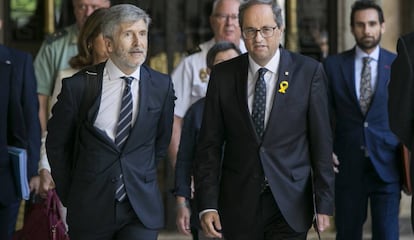Minister, Catalan interior chief agree on need for “neutrality” in public spaces
Representatives from the central and regional government held a security meeting today, at which the symbols in support of jailed pro-independence leaders topped the agenda

After a security meeting in Barcelona today, representatives from the Catalan government and the central government in Madrid announced their “commitment to guaranteeing neutral public spaces” in the region, in response to the widespread placing of yellow ribbons and other symbols in support of the jailed pro-independence leaders in the streets of Catalonia.
“We are all conscious of the fact that the streets cannot be monopolized by anyone,” said Interior Minister Fernando Grande-Marlaska after the meeting, at which hardline pro-independence regional premier Quim Torra was also present.
We are all conscious of the fact that the streets cannot be monopolized by anyone
Interior Minister Fernando Grande-Marlaska
Catalonia has been flooded with yellow ribbons and other symbols since pro-secession politicians such as the leader of the Catalan Republican Left (ERC), Oriol Junqueras, were placed in pre-trial custody for their role in last year’s independence drive, which culminated in a unilateral declaration of independence inside the regional parliament at the end of October.
The symbols have proved a point of conflict, however, with groups of citizens organizing operations to remove them from the streets, and supporters of the jailed leaders quickly putting them back. There have been several violent incidents relating to the ribbons and other symbols, while even politicians have got involved in clearing them up. There has been widespread unease both inside and outside Catalonia, however, about the displaying of such symbols on public buildings.
Today’s security meeting between the central and regional governments was key, given that Grande-Marlaska is part of the new Socialist Party (PSOE) administration of Prime Minister Pedro Sánchez, which is aiming to build bridges with Catalonia after relations completely broke down between the regional government and the former administration of conservative Popular Party (PP) prime minister Mariano Rajoy. After the unilateral declaration of independence last year, Rajoy’s government invoked Article 155 of the Constitution, suspended the region’s autonomous powers and sacked the Catalan government.
Regional interior chief Miquel Buch said that he didn’t consider there to be “a serious problem of social harmony” over the ribbons
Regional interior chief Miquel Buch tabled the issue of the ribbons as the first item on the agenda at today’s meeting. Interior Minister Grande-Marlaska expressed his “concern” over the effect the issue is having on social harmony in the region, but Buch responded that he didn’t consider there to be “a serious problem of social harmony,” despite the violent incidents and threats that they have prompted.
Buch did, however, commit to working to avoid “confrontation” between citizens due to the issue, and admitted that there “had been more incidents” in recent weeks due to a “certain political party” that is interested in this being a problem. He was clearly alluding to Ciudadanos, whose national party chief, Albert Rivera, and regional leader, Inés Arrimadas, took to the streets of a town in Catalonia recently to remove the ribbons in full view of photographers and reporters.
But the commitment to ensuring social harmony went no further than that – a generic statement based, according to attendees of today’s meeting, on “loyalty” between institutions and the “trust” that the regional police force, the Mossos d’Esquadra, will act so that “citizens can exercise their rights and their freedoms,” the interior minister stated.
After the nearly two-hour meeting, Marlaska and Buch put on a united front before the press
“The Mossos have done a great job and we trust in them should there be problems of citizen safety,” added Buch, calling on members of the public to “call the police” if there are any problems between citizens over the yellow ribbons.
After the nearly two-hour meeting, Marlaska and Buch put on a united front before the press. Asked about the central government’s plan to send extra police officers to Catalonia ahead of the Diada – Catalonia Day, on September 11 – and on the basis of reports that organized groups may be planning disturbances in the region – the interior minister played down the news, and said that the only aim was to “help” the Mossos should they find themselves without sufficient resources. Buch, for his part, said that the regional police would know how to perform their duties without the need for reinforcements.
English version by Simon Hunter.
Tu suscripción se está usando en otro dispositivo
¿Quieres añadir otro usuario a tu suscripción?
Si continúas leyendo en este dispositivo, no se podrá leer en el otro.
FlechaTu suscripción se está usando en otro dispositivo y solo puedes acceder a EL PAÍS desde un dispositivo a la vez.
Si quieres compartir tu cuenta, cambia tu suscripción a la modalidad Premium, así podrás añadir otro usuario. Cada uno accederá con su propia cuenta de email, lo que os permitirá personalizar vuestra experiencia en EL PAÍS.
¿Tienes una suscripción de empresa? Accede aquí para contratar más cuentas.
En el caso de no saber quién está usando tu cuenta, te recomendamos cambiar tu contraseña aquí.
Si decides continuar compartiendo tu cuenta, este mensaje se mostrará en tu dispositivo y en el de la otra persona que está usando tu cuenta de forma indefinida, afectando a tu experiencia de lectura. Puedes consultar aquí los términos y condiciones de la suscripción digital.








































